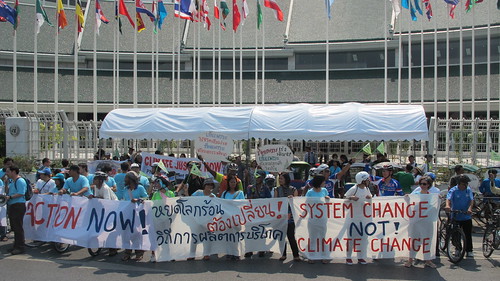As the latest round of UN climate negotiations begin in Bangkok this week, the city's papers are still filled with images of the flooding that has devastated much of southern Thailand this week.

Cyclists from across Bangkok rally outside the UN headquarters to push countries to "stop spinning their wheels" and take action on climate change now.
The floods are the latest evidence that the climate crisis is no longer a future threat, but a present reality. Floods, fires, oil spills, and nuclear disasters: this is our current world with 390 parts per million of CO2 and the atmosphere and dirty energy pushing the number even higher.
The goal of this week's negotiations is to move on from the last November's yearly climate summit in Cancun and set an agenda for negotiators to follow for the year. A meeting to plan more meetings may sound tedious, and in many regards, the talks here in Bangkok are a tiresome display of the same rhetoric and arguments we've seen in the past. The European Union continues to show a lack of leadership, the United States is actively trying to throw wrenches into the process, oil dependent developing nations are wary of asking for strong action, and the voices of the powerless continue to be largely ignored.
At the same time, there are some key questions being debated here in Bangkok that will continue to be important over the coming year, such as: What legal form will a new international agreement take? How will countries close the gap between their pledged reductions and what science says is necessary? Where will the money for a new Green Climate Fund come from and how will the fund be administered?
While these questions are debated here in Bangkok, the real answers will be determined by what happens back in capitol cities around the world.
I've attended these climate meetings for the last five years — still a short time compared to many of the representatives here who have battled with this process for decades — and each year it becomes ever more clear that to make real, substantial progress, we need to continue to grow a global climate movement that can create the pressure necessary to force our political leaders to join us in truly addressing the climate crisis.
Thankfully, the months since the climate talks in Cancun have not only seen news of increased dirty energy and climate disasters, but also of uprisings against dictatorship across the Middle East and in other parts of the world. No matter what country we're in, we live under the specter of the climate crisis and the rule of fossil fuel polluters. In order for there to be real progress at the United Nations, those dictatorships must fall as well.
Over the coming week, our 350.org team will be meeting with allies from around the world, talking with our top organizers here in Southeast Asia, and refining our plans for the coming year. Together — with your help — we can begin to do the real work necessary for true climate action: building a global climate movement.